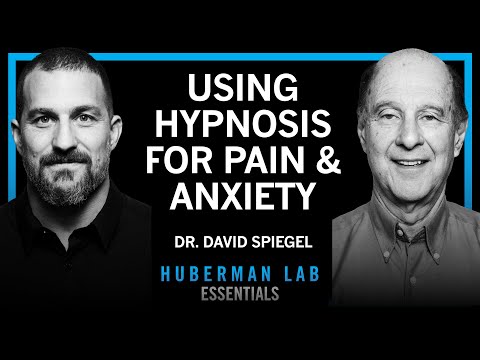In this Huberman Lab Essentials episode, my guest is Dr. David Spiegel, MD, the Associate Chair of Psychiatry & Behavioral Sciences, Director of the Center on Stress and Health, and Director of the Center for Integrative Medicine at Stanford University School of Medicine.
We discuss the science and clinical applications of hypnosis, including how hypnosis works in the brain. We examine the evidence-based uses of clinical and self-hypnosis for pain, trauma, phobias, sleep and stress, and explain how to gauge your own level of "hypnotizability." We also outline practical ways to access these tools, from working with a trained clinician to using structured self-hypnosis protocols.
Show notes: https://go.hubermanlab.com/KsO42nz
Huberman Lab Essentials are short episodes focused on essential science and protocol takeaways from past full-length Huberman Lab episodes. Watch the full-length episode: https://youtu.be/PctD-ki8dCc
Watch more Huberman Lab Essentials episodes: https://youtube.com/playlist?list=PLPNW_gerXa4OGNy1yE-W9IX-tPu-tJa7S
*Timestamps*
00:00:00 David Spiegel
00:00:20 What is Hypnosis?; Clinical vs Stage Hypnosis
00:02:33 Brain & Hypnosis, Cognitive Flexibility
00:06:14 ADHD, Self-Hypnosis & Focus
00:07:16 Stress Reduction, Mind-Brain Connection; Improve Sleep, Phobias
00:10:35 Narrative & Hypnosis, Mental State Change; Reframing Trauma
00:16:44 Naming Importance; Clinical Hypnotist, Durability of Hypnosis, Reveri App
00:19:17 Obsessive Thoughts, OCD, Hypnosis
00:20:35 Hypnotizability, Spiegel Eye Roll Test, Eye-Brain Connection
00:23:51 Trauma Recovery, Deliberate Self-Exposure to Pain or Trauma, Control
00:25:57 Mind-Body Connection, Control; Reframing Pain, Tool: Opportunity for Action
00:28:42 Children & Hypnosis; Group Hypnosis
00:30:29 Breathing in Hypnosis, Cyclic Sighing, Relaxation
00:32:06 Peak Performance & Hypnotic States
00:33:15 Reveri Hypnosis App, Finding Clinical Hypnotist; Acknowledgements
Disclaimer & Disclosures: https://www.hubermanlab.com/disclaimer



